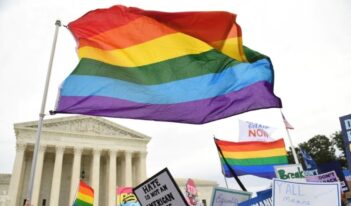
EPA tightens standards for industrial air pollution, the D.C. Circuit rejected former President Trump’s claimed immunity from criminal prosecution and more…
IN THE NEWS
- The U.S. Environmental Protection Agency (EPA) strengthened limits on fine industrial particle emissions, also known as soot. The new rule will reduce acceptable emission rates of soot—which EPA described as “one of the most dangerous forms of air pollution”—by 25 percent. EPA further announced that it will monitor air quality around industrial sites and will begin considering health risks to nearby populations, especially poor and minority communities, which are disproportionately located near pollution sources. Many business groups fear that the new standard will harm business in nearly one fifth of U.S. counties, inhibiting manufacturing and job growth.
- In a unanimous ruling, three judges on the U.S. Court of Appeals for the District of Columbia Circuit rejected former President Donald Trump’s claim to absolute immunity from criminal prosecution for allegedly subverting 2020 election results. The court found no legal basis for President Trump’s assertion that he had acted in an “official” capacity while engaging in alleged election interference that would entitle him to executive immunity. The judges also rejected President Trump’s arguments under the Double Jeopardy Clause of the Fifth Amendment—which protects individuals from being prosecuted twice for the same crime—, finding that Congress’s separate impeachment charges were not criminal and do not appear in the criminal indictment. A spokesperson for President Trump stated that Trump would appeal the decision.
- The U.S. Supreme Court heard oral arguments in a case that would decide whether the 14th Amendment disqualifies former President Trump from running for president again. The 14th Amendment’s insurrection clause barred former Confederates from running for office by making anyone who engaged in “insurrection” against the United States ineligible for public office. The Supreme Court granted the appeal from the Colorado Supreme Court which ruled that the former president’s activities on January 6, 2021 constituted insurrection. During the argument, the justices questioned whether President Trump’s conduct on January 6 violated the insurrection clause and whether states could declare someone ineligible for office under the insurrection clause as well.
- The U.S. Department of Health and Human Services (HHS) issued a final rule implementing changes to the regulations governing methadone clinics and other opioid addiction treatment centers. The final rule permits patients to receive unsupervised doses of methadone—a synthetic opioid—and allows practitioners to prescribe certain opioid medications via telehealth appointments. Through this final rule, HHS makes its addiction treatment guidance issued during the COVID-19 pandemic permanent. HHS contends that the final rule will “create a patient-centered perspective and reduce barriers to receiving care.”
- The Federal Communications Commission (FCC) proposed a new rule that would require cable and broadcast providers to reimburse customers during television “blackouts.” TV blackouts occur when providers do not offer paid-for video programming after rebroadcasting negotiations between providers fail. The FCC noted that blackouts, which have “increased dramatically” over the past decade, cause subscribers to pay the same monthly fee for a service package with fewer channels than they agreed to pay for. The FCC invited comment on whether rebate amounts should correspond to the value of access to the channel that was shut off due to the blackout and whether state and local authorities are adequately equipped to enforce the proposed rule.
- The Occupational Safety and Health Administration proposed a new standard to address occupational hazards for emergency responders, such as firefighters. The proposed standard responds to the risk of fatalities and injuries to emergency responders and will include a comprehensive range of hazards faced by emergency responders. The standards will also comply with industry standards issued by the National Fire Protection Association for safe conduct in emergency situations.
- The Office for Victims of Crime within the U.S. Department of Justice proposed updates to its Victim Compensation Program Guidelines. The program authorizes grants to states for victim compensation programs, which provide funds for certain expenses incurred by crime victims. The proposed updates clarify who is eligible for victim compensation, what expenses incurred during a crime can be covered by the funds, and under what conditions a victim may receive compensation. The Office for Victims of Crime concluded that adjustments to the guidelines will help streamline the coordination of the program.
- A National Labor Relations Board regional director held that members of the Dartmouth College varsity basketball team are employees of the university and can vote to form a union. Prior to this decision, universities considered student-athletes as students not permitted to unionize or receive direct compensation. After the agency’s decision, should the Dartmouth basketball team vote to unionize, it would become the first union of National Collegiate Athletic Association student-athletes in the country. Cade Haskins and Romeo Myrthil, current Dartmouth basketball players, called the ruling “a significant step forward for college athletes.”
- Oklahoma lawmakers introduced a bill that, if passed, would bar state agencies from celebrating LGBTQ Pride Month or displaying Pride flags on state property at any point during the year. The bill would also ban the use of public funds to recognize and promote Pride Month. Freedom Oklahoma Executive Director Nicole McAfee cautioned that the bill would “disrupt the ability of Oklahoma agencies to serve” LGBTQ individuals in Oklahoma.
WHAT WE’RE READING THIS WEEK
- In a forthcoming article in Research in International Business and Finance, Emily Fletcher and Charles James Larkin of Johns Hopkins University, and Shaen Corbet of Dublin City University discussed the impact of cryptocurrency regulation on terrorist financing. Fletcher, Larkin, and Corbet argued that current regulatory regimes do not prevent terrorist financing because they overlook small cryptocurrency transactions and do not overcome the anonymity of such transactions. Rather than relying on public regulation to prevent such financing, Fletcher, Larkin, and Corbet proposed that the international community grant an international, private organization regulatory authority over cryptocurrency companies.
- The U.S. Government Accountability Office (GAO) published a report finding that the Federal Bureau of Prisons —responsible for maintaining safe, humane, and secure federal prisons—failed to implement the Justice Department’s 2016 recommendations to reform solitary confinement practices. The GAO discovered that the Bureau did not delegate responsibility for implementing recommendations to anyone and did not establish timelines for completion. Furthermore, the GAO found that the Bureau lacks a process to verify that corrective actions were implemented and does not review data of prisoner complaints about living conditions.
- In an article published by the Virginia Journal of Social Policy and the Law, Liz Tobin-Tyler, an associate professor at Brown University, argued that policymakers, courts, and the general public must develop a shared conception of parental rights to best serve the public good and individual interests. Tobin-Tyler explained that the state has an interest in both protecting children from harm and in cultivating educated and healthy citizens. Tobin-Tyler contended that these state interests must be balanced with parents’ individual rights to raise their children autonomously. Tobin-Tyler proposed that the government prioritize policymaking that provides parents with the resources and support they need to raise their families rather than defaulting to state intervention.
EDITOR’S CHOICE
- In an essay in The Regulatory Review, Robyn M. Powell, a professor at the University of Oklahoma School of Law, concluded that the child welfare system discriminates against parents with disabilities. According to Powell, a majority of states include a parent’s disability as a potential reason for terminating parental rights. Several states even consider a parent’s disability as an aggravating factor against the reunification of a parent with their child, Powell observed. In turn, Powell calls for a new welfare system that supports parents with disabilities instead of punishing them.



